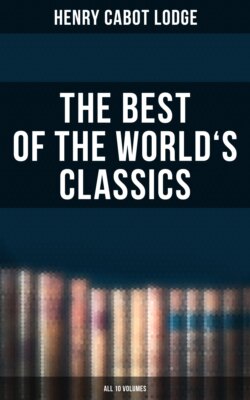Читать книгу The Best of the World's Classics (All 10 Volumes) - Henry Cabot Lodge - Страница 92
На сайте Литреса книга снята с продажи.
IV THE PILOT[84]
ОглавлениеTable of Contents
A tempest and storme hurt a Pilot, but notwithstanding they make him not worse. Certaine Stoicks do thus answer against this, that a Pilot is made worse by a tempest and by a storme, because that thing which he had purposed he cannot effect, nor keep on his course. Worse is he made, not in his skill, but in his work. To whom the Aristotelian: therefore, saith he, pouertie and dolour, and what soeuer such like thing there shall be, shall not take vertue from him, but shall hinder his working thereof.
This were rightly said, except the condition of a Pilot and of a wise-man were unlike. For the purpose of him is in leading his life, not without faile to effect that which he assayeth to doe, but to doe all things aright. It is the purpose of the Pilot, without faile to bring a ship into a hauen. They be seruile arts, they ought to performe that which they promise. Wisedome is mistresse and gouernesse. The arts doe serve to, wisedome commandeth our life. I judge that we must answere after another sort, namely that neyther the skill of the gouernour is made worse by any tempest, nor yet the very administration of art. The gouernour hath not promised prosperous successe unto thee, but his profitable endeuour, and skill to gouerne the ship. This appeareth the more, by how much the more some force of fortune hath hindered him. He that hath beene able to say this, O Neptune, this ship was neuer but right, hath satisfied skill. A tempest hindereth not the work of a pilot, but the successe.
What therefore sayeth thou? Doth not that thing hurt a Pilot, which hindereth him from entring the Port? Which causeth his endeuours to be vaine? Which eyther beareth him back, or detaineth and disarmeth him? It hurteth him not as Pilot, but as one that doth saile. Otherwise it doth not so much hinder, as shew the Pilot's skill. For euery one can, as they say, be a pilot in the calme. These things hinder the ship; not a pilot as he is a pilot. Two persons a pilot hath; the one common with all who haue gone aboard the same ship, wherein he himselfe also is a passenger; the other proper as he is gouernour. The tempest hurteth him as he is a passenger not as a Pilot. Furthermore the art of a Pilot is another good, it appertaineth to those whom he carrieth: as the art of a Physitian appertaineth to those whom he doth cure. Wisedome is a common good; and is proper to ownes selfe, for those with whom he doth liue. Therefore peraduenture a Pilot is hurt, whose promised seruice to others is let by a tempest.
A wise man is not hurt by pouertie, nor by doulour, nor by other tempests of life. For not all workes of him be hindered, but only those that pertain to other men; alwayes is he himself indeed, the greatest of all, when fortune hath opposed herselfe unto him, then manageth he the businesse of wisdome itselfe: which wisdome we haue said to be both anothers and his owne good. Furthermore not then indeed is he hindered to profite other men, when some necessities do presse him. Through pouertie he is hindred to teach, how a Commonwealth may be managed: but he teacheth that thing, how pouertie is to be managed. His worke is extended all his life long. Thus no fortune, no thing excludeth the acts of a wise-man. For he doth not that verie thing, whereby he is forbidden to do other things. He is fit for both chances: a gouernour of the bad, an ouercommer of the good. So I say hath he exercised himselfe, that he sheweth vertue as well in prosperous as in aduerse affaires; neyther looketh he upon the matter thereof, but upon itselfe. Therefore neither pouerty nor doulour, nor any other thing which turneth back the unskilfull, and driuest them headlong, hindereth them. Hast thou rather he should be pressed? He maketh use of it. Not only of iuorie did Phidias know how to make images: he made them of brasse. If marble were unto him, if thou hadst offered baser matter, he would haue made such a one thereof, as could be made of that which was the best.
So a wise-man will show uertue, if he may, in wealth, if not in pouertie: if he shall be able, in his countrie; if not in banishment; if he can, being a commander; if not, being a souldier: if he can being sound; if not, being weaker what fortune soeuer he shall entertaine, he will performe some memorable thing thereby. Certain tamers there be of wild beasts, who teach the fiercest creatures, and which terrifie a man when they meet him, to suffer the yoake: and not wanted to have shaken fiercenesse off, do tame them, euer to keep them companie. The master useth often to thrust out his hand to Lions; they kisse it. The keeper commandeth his tyger; the Ethiopian Player commandeth his elephants to fall upon their knees, and to walke upon a rope; so a wise-man is skilfull to subdue euil things. Dolour, pouertie, ignominie, prison, banishment, when they come unto him, are made tame.
